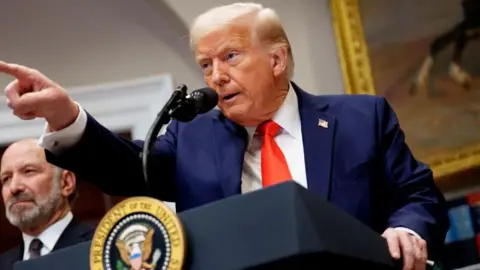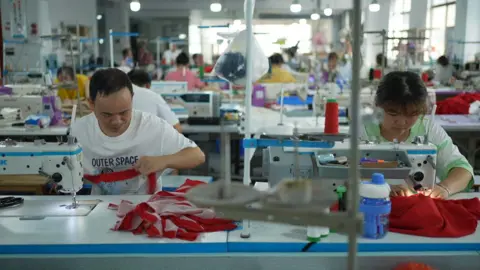Business journalist, BBC News

Getty Images
US President Donald Trump has announced plans to impose additional tariffs following his recent decision to introduce import taxes on steel and aluminum entering the United States, which has led to retaliatory actions from the European Union (EU) and Canada.
Trump acknowledged he would retaliate against these countermeasures, reiterating his intention to introduce “reciprocal” tariffs on nations worldwide next month.
“Whatever they charge us, we are going to charge them,” he declared.
This threat signifies an intensifying trade war that has unsettled financial markets, raising concerns about the economic repercussions for consumers and economies globally, including in the US.
On Wednesday, Trump advanced with his plan to expand US tariffs on steel and aluminum, imposing a universal duty of 25% and eliminating previous exemptions granted to shipments from select countries.
This was preceded by an order earlier in the month that raised taxes on Chinese imports to a minimum of 20%.
In addition, Trump has indicated potential tariffs on a variety of specific items, such as copper, lumber, and automobiles.
Leaders in Canada and Europe deemed the new metal tariffs unjustifiable and responded with their own tariffs on a wide array of US products.
Other nations that are major suppliers of metals to the US, including the UK, Australia, Mexico, and Brazil, have refrained from immediate retaliatory actions.
“Like everyone else, I’m disheartened to witness global tariffs concerning steel and aluminum, but we will adopt a pragmatic stance,” stated UK Prime Minister Sir Keir Starmer.
“We are… in negotiations for an agreement that encompasses tariffs if we succeed. However, we will explore all options available.”
Canada announced that as of Thursday, it would impose a 25% tax on approximately C$30 billion ($20 billion; £16 billion) worth of US goods, including items such as steel, computers, and sports equipment.
The EU confirmed it would increase its tariffs on up to €26 billion ($28 billion; £22 billion) worth of US products, such as boats, bourbon, and motorcycles, starting April 1.
EU President Ursula von der Leyen noted that the response aimed to be “strong but proportionate” and emphasized the EU’s willingness to engage in “meaningful dialogue”.
“Tariffs are essentially taxes. They are detrimental to businesses and even worse for consumers,” she remarked, cautioning that the economic turmoil jeopardizes jobs and could increase prices.
“No one benefits from this—neither in the EU nor the United States.”
Trump has expressed interest in enhancing US steel and aluminum production over the long term, but critics argue that the immediate impact of import taxes will elevate prices for US consumers and hinder economic growth.
Prominent food manufacturers such as Quaker Oats and Folgers coffee have requested targeted exemptions from tariffs on imports like cocoa and fruit, as indicated in a letter obtained by Reuters.
Similarly, PepsiCo, Conagra, and J M Smucker have asked the president to exempt imported ingredients not available in the US, according to the letter sent by the Consumer Brands Association.
Among the imports cited as unavailable domestically are coffee, oats, cocoa, spices, tropical fruits, and tin mill steel, commonly utilized in food and household items, according to Reuters reports.
The import taxes are also expected to diminish demand for steel and aluminum not produced in the US, negatively affecting manufacturers located elsewhere.
The EU approximates that the latest US tariffs will impact around 5% of its total exports to the US, while the US is the destination for roughly 90% of Canada’s steel and aluminum exports.
US stock indices showed mixed results on Wednesday after two days of significant decline. The Dow fell by 0.2%, the S&P 500 rose nearly 0.5%, and the Nasdaq increased by 1.2%.
During an appearance at the White House alongside Irish Prime Minister, Taoiseach Micheál Martin, Trump stated he had no intention of backing down from the trade conflict, expressing his dissatisfaction with EU trade policies.
He pointed to concerns related to legal penalties imposed on Apple and regulations he argued placed US agricultural products and vehicles at a disadvantage.
“They’re acting in accordance with what they should be doing for the EU, but it creates hostility,” he commented.
Reiterating his threat of implementing tariffs on European automobiles, he concluded: “We are going to win that financial struggle.”










 Bengali (Bangladesh) ·
Bengali (Bangladesh) ·  English (United States) ·
English (United States) ·